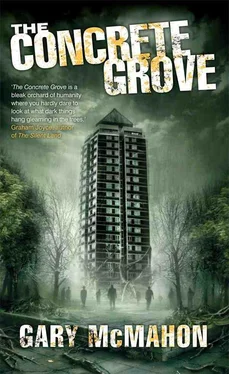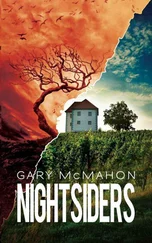…AND THIS TIME, in the dream, she is standing inside a ring of tall oak trees, looking up to watch the sunlight as it filters through the brown-tinged leaves. She squints, momentarily blinded by the light, and then clouds pass overhead and she can open her eyes again.
The creature she saw last time, near the swinging corpse of her mother, has moved on. The corpse has been taken down. She is alone. Her skin is warm, and when she looks down she sees blood smeared on the inside of her naked thighs. Deep red clots cling to the sides of her knees; red patterns decorate her shins and feet.
The sun moves west to east, travelling too-fast across the flat sky, and she is momentarily plunged into shadow. The trees creak, their ancient trunks shifting to accommodate the new position of the light source. Their branches are striving to be touched by the sun’s bright fingers.
She feels empty. She is bereft. Something has gone away, leaving her behind. Whatever she was carrying inside her has moved on. She takes a tentative step forward, and then another, gradually moving from the centre of the small grove of oak trees to its outskirts. She reaches out a hand and caresses the old, wrinkled bark as she passes one of the trees, and it moves beneath her hand, twisting like a living body. Her fingertips find a crack in the bark and slip inside, feeling the warm sap beneath. Under the toughened hide of the tree she touches something smooth and unmarred, not unlike newly formed human skin.
She stops and stares at her fingers. They are sunk up to the first joint into the tree trunk. She gently peels away a piece of bark, being careful not to cause too much damage to the delicate structure. The tree moves again, but this time as if it is responding to her touch. There is something almost erotic about the way the trunk slowly spins, turning eagerly to meet her wanton attention.
The underside of the bark is tacky; it sticks to her fingers as she fondles the material. She pulls the chunk of bark away and lets it drop to the ground, where it comes softly to rest on the grass and the fallen leaves next to her bloody feet. Leaning in close, she examines the patch that she has uncovered. It is human skin: soft and pink and covered in a red-tinged, viscous liquid, like the wet flesh of a newborn baby.
As she watches, the skin begins to rise and fall. She rests her fingers on the area and can feel a pulse, which beats much slower than her own.
“Alive?” The question is one that barely needs voicing. It is obvious to her now that the tree — or the thing she has found beneath the layer of bark, whatever it is — lives. It is breathing; it has a pulse and probably a heartbeat; there is blood, not sap, running through its mysterious system.
She presses against the patch of skin with her fingertips and watches as it pushes inward, making a slight indentation. The tree shifts; a small twitching motion. The leaves above her shudder. The sound they make is like tracing paper being crumpled up in a fist.
“Where is it?” The bark surrounding the area she has uncovered starts to peel away. The trunk begins to strip naked, revealing under its dry covering a vaguely human shape. There is the suggestion of legs, wide thighs, and the smooth curves of hips. Large breasts without nipples. The subtle v-shape of a crudely carved pudendum. It resembles a primitive wooden sculpture, but soft to the touch, and slightly elastic.
There is no head; the body is massive, and visible only to the shoulders. Whatever sits above is covered by the canopy of leaves.
Without thinking, she presses her hand further, deeper into the midriff of the unveiled body. The moist skin yields, and then splits. Her hand enters easily into the hole, that same viscous fluid aiding its passage. She slides both hands inside up to the wrist, gently spreading the edges of the wound, and grasps what she finds waiting within the cavity she has made.
The thing is rigid, motionless. She pulls it out, stepping back to allow it some space.
It is a small, rough puppet: no face, no fingers on the end of its stumpy hands. Just a rough-hewn caricature: a rude representation of a human child. She holds it close, hugging it against her naked chest. Her nipples harden, responding to the puppet’s silent hunger.
The puppet does not move. It is nothing more than an empty shell, a half-finished simulacra taken from inside a larger organism, like a splinter of prosthetic bone removed from torn flesh. There is something missing, a vital element. It is hungry but it is unable to feed. She presses its smooth, formless head against her breast, willing for it to partake of her food. Watery milk dribbles from the ends of her nipples, splashing onto this soulless, lifeless hunk of wood.
She doesn’t know what else to do.
Nobody has ever prepared her for this.
“Help me.” Her voice is tiny, lost in the primeval wood. “Help us. We need you. There’s no-one else. I beg you, just help us out of this mess.” Tears streak down her face, dripping delicately onto the top of the puppet’s inchoate head. Then, in reaction to her fathomless need, the puppet’s head slowly begins to move. It turns, pivoting on the broad neck, and the thing looks up at her. The puppet has no eyes but she can feel its gaze.
“Please. Help us. Help me and my mum… we need… we need…”
The trees writhe, their leaves speaking a language she cannot understand. A large flock of small birds flies overhead, darkening the sky and casting a flowing shadow on the ground at her feet.
“We need help.”
The puppet begins to shake, its stunted arms and blocky legs wriggling as it struggles in her grasp.
“We need you.”
The puppet, she realises, is laughing.
BOATER FELT UNCOMFORTABLE as he led the woman up the stairs to Monty’s office. He could sense her close behind him as he climbed the stairs, and hear the sound of her breathing in the enclosed space. She wasn’t wearing much perfume, but he could detect the trace of a light floral scent on her skin. She was scared — of course she was; they always were. They knew what they were here for, and what was going to happen to them, but still they were afraid. Monty enjoyed that fear; it was part of the thrill. Boater used to like it, too, but recently things had changed.
He reached the top of the stairs and turned around to face Lana. She was beautiful, even with her face scrubbed clean of make-up. The rage he’d felt towards her down by the Quayside, when he’d been confused and wrong-footed by his own churning emotions, had gone now. It had been replaced with a sense of longing.
“Just wait here for a minute. I’ll tell him you’re here.”
“Thank you,” she said, leaning her shoulder against the wall. She had not yet reached the top of the stairs, and stood two steps down from the short landing. The shadows clung to her, roaming over her body like eager hands. Boater thought that she didn’t look quite real: an erotic phantom.
“Just a minute… ” He spun around in the tight space and knocked on the office door. The light bulb in the ceiling flickered.
“Yeah. Come in.” Monty’s voice was muffled, but he sounded distracted.
He’s probably scribbling in his little book , thought Boater as he pushed open the door and stepped inside.
The table lamps were set low down, near the floor, giving the room a dusky atmosphere. The main lights were off and the window blinds were closed. Monty sat at his desk with his feet tucked up underneath him on the big chair. He was wearing his reading glasses, something that humanised him in a way that Boater found contradictory. Surely monsters didn’t wear reading glasses…
“She’s here. The Fraser woman. She’s here, just like you said.”
Читать дальше












